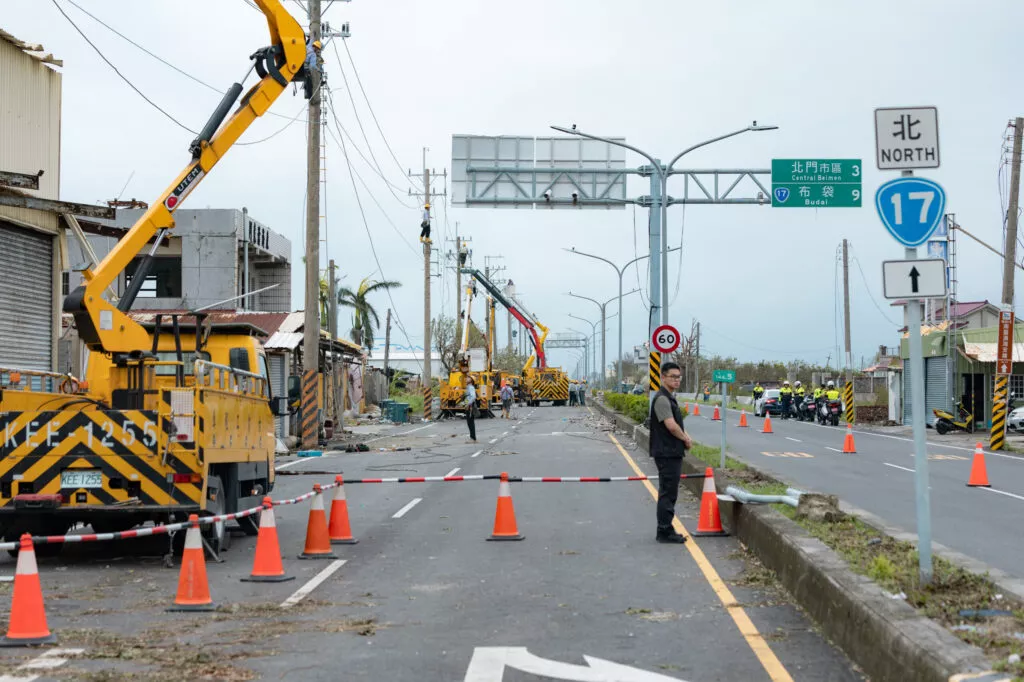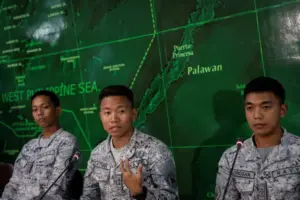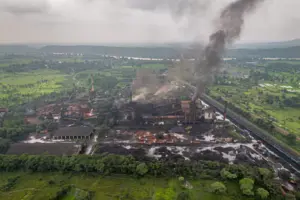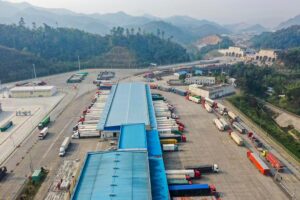Taiwan’s climate resilience requires information resilience
On 6 July 2025, Typhoon Danas battered Taiwan, resulting in fatalities and injuries as well as significant economic losses, including extensive crop damage and infrastructure destruction. The disaster not only exposed that government efforts to build climate resilience remain insufficient and too slow, but also underscored the need to address information resilience as a core part of energy transition policy, rather than a separate issue.
As of 14 July 2025, Taiwan’s Ministry of Agriculture estimated that the disaster resulted in agriculture-related losses exceeding NT$2.6 billion (US$85 million). The damage highlights Taiwan’s struggle with climate resilience — the capacity to anticipate and manage shocks and trends driven by climate change.
Among the affected areas, southwestern Taiwan was hit the hardest. Owing to its natural advantages, the region has long been a hub for solar energy development. The typhoon’s damage to solar panel installations, with no failures at other renewable energy facilities at the time, reignited public anxiety and deepening distrust towards the government’s solar-focused energy transition. Earlier, the Heshan solar project controversy in Kaohsiung had already fuelled scepticism, adding to a history of scandals and land disputes that have cast a shadow over solar energy development.
After widespread reporting of solar panel damage, recurring false narratives surged again. Claims that ‘solar panels are poisonous and would impact water quality’ or that ‘damaged solar panels are garbage that cannot be recycled’ were amplified by specific media outlets and political figures, despite repeated debunking by scholars and experts. These messages were echoed on political talk shows and mainstream news networks, intensifying confusion and hostility towards solar energy.
In 2022, Taipei set out a net-zero roadmap to demonstrate its determination to strengthen Taiwan’s climate resilience and accelerate the energy transition. Despite active public–private engagement, a key barrier remains effective public communication and trust. The government has struggled to communicate its energy policies in clear, accessible language and has failed to adequately address public concerns about the changes brought by energy transition policies.
Several major power outages occurring since 2017, combined with rising electricity demand from the semiconductor and other high-tech industries, have further eroded confidence. Rumours, false claims and disinformation muddle an already fragile information ecosystem. The communication gap reflects a broader neglect of information resilience within climate policy.
An online survey of 1301 respondents conducted by Global Views Research in July 2024 found approximately 70 per cent of respondents believe a lack of transparency has made the renewable energy market more vulnerable to monopolisation by large corporations. Over 68 per cent said scandals in the solar industry have eroded trust in Taiwan’s energy transition. While no research has yet established a strong correlation in Taiwan between distrust and delays in renewable projects, studies from elsewhere suggest a link may exist. In Taiwan, online discourse, opposition rhetoric and certain media narratives indicate that public distrust could still be a contributing factor.
Two trends interact in dangerous ways — growing distrust and tension between government and the public around energy policy and implementation, and the increasing frequency of extreme weather events. Extreme weather provides a prime opportunity to circulate misinformation, undermining the implementation of urgent emissions mitigation and climate resilience measures. Damage from Typhoon Danas caused entrenched disagreements on renewable energy and triggered a surge of distrust towards solar power. Opposition politicians, media pundits and pro-nuclear advocates seized the moment to advance their own agendas.
Though government agencies, civil society groups and some online opinion leaders attempted to counter these attacks through fact-checking and public statements, the limitations of fact-checking as a long-term solution were again exposed.
While fact-checking remains a key component of information resilience efforts in Taiwan, researchers and practitioners have long likened it to a game of ‘Whac-A-Mole’ — a reactive strategy that struggles to keep pace with the speed and volume of false claims. This is especially problematic on platforms engineered to maximise user attention, often by promoting sensational and polarising content.
To strengthen information resilience, the government must first acknowledge that its current energy transition plan must improve. Policies should be revised to embed just-transition principles at their core and be developed through meaningful collaboration with communities impacted by policy and projects. Clear, simple and transparent communication, alongside proactive, engaging education is essential to earn public trust. Equally important is anticipating future crises that could jeopardise energy transition progress and preparing targeted ‘inoculation’ strategies against predictable disinformation campaigns.
Building trust also requires deeper collaboration with civil society, the establishment of accountable, reliable sources of information that citizens can turn to amid uncertainty and support for regional experts and local community champions for climate resilience.
A May 2024 joint report by the National Science and Technology Council and the Taiwan Ministry of Environment warned that extreme weather events like Typhoon Danas will become more frequent and severe unless climate change is addressed. Through ambitious investment, sound engineering and Taiwan’s innovative spirit, the country can build resilience to limit the damage to families, communities and the economy. Taipei cannot treat climate resilience and information resilience as two separate challenges to overcome. In today’s information ecosystem, they are intertwined and progress on one cannot be sustained without the other.
Elena Yi-Ching Ho is Co-founder and Taiwan Lead at the Research & Action Hub and PhD candidate in Communication at Queensland University of Technology.
https://doi.org/10.59425/eabc.1758016800
Source: East Asia Forum





